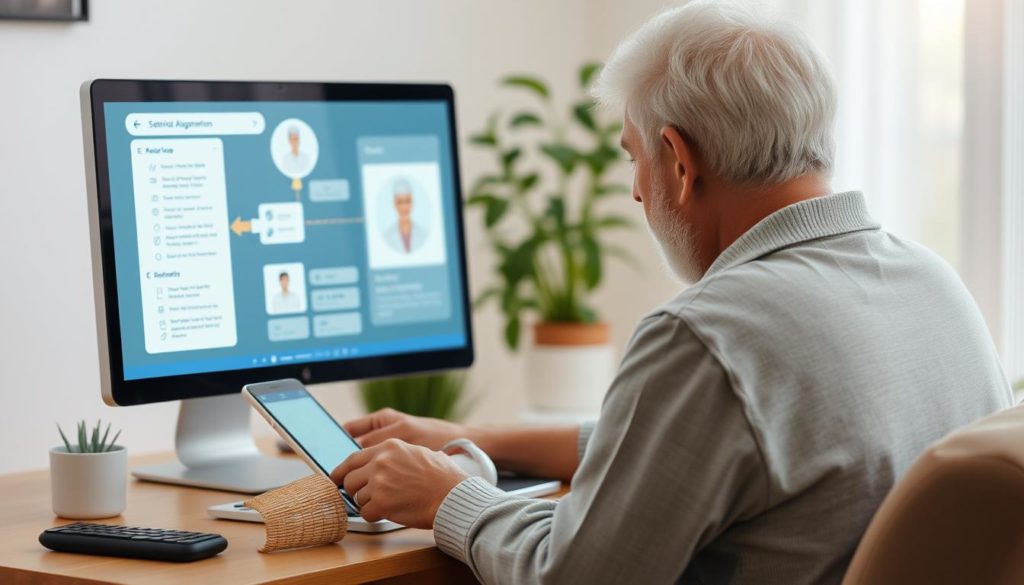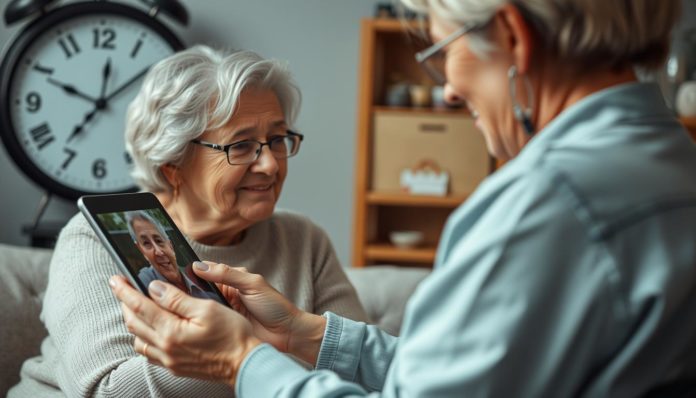Did you know more than 15 million Americans care for someone with Alzheimer’s without pay? Many of them are doing this from afar, even across thousands of miles. This fact sheds light on the tough parts of caregiving from a distance, especially for Alzheimer’s. Being far away means you need to be very organized and creative. No matter if your loved one is living alone, with family, or in a care home, knowing how to manage long-distance caregiving for Alzheimer’s is very important.
Talking often and positively, handling medical visits, and finding local help are key to good Alzheimer’s care from a distance. The Community Resource Finder is a great tool to locate these aids. Staying up to date on home safety, food needs, and care choices is crucial as the disease gets worse. Visiting them to check in and taking care of your own mental health are vital tips for long-distance caregiving to make sure your loved one is safe and happy.
Even with miles between you, your care and involvement are strong. By keeping things in order, using tools like ALZNavigator™, and being gentle with yourself, you can still give top-notch care.
Understanding the Challenges of Long-Distance Caregiving
Handling Alzheimer’s care from afar is tough. Caregivers face both financial and emotional challenges. The cost of travel and managing money remotely can add up. Not being there with loved ones can also take an emotional toll.

Financial Strains
Long-distance Alzheimer’s care can get expensive. This includes the cost of visiting loved ones and handling care from a distance. It’s important to manage finances well in this situation. This helps caregivers support their loved ones consistently.
Emotional Stress
It’s hard not giving care in person. This situation can make caregivers feel guilty and helpless. It’s crucial to find a balance. Caregivers need to rely on others nearby to make sure their loved ones are well cared for.
Coordination Difficulties
Long-distance caregivers must handle a lot of information. They need to keep up with medical, insurance, and legal details. Regular visits are essential. They help caregivers stay informed about their loved one’s condition.
Handling money matters online and preparing documents are key too. These tasks prevent problems like unpaid bills. Being thorough in managing these aspects helps reduce some stress.
Establishing Effective Communication
Communication is key in caregiving, especially for someone with Alzheimer’s. Creating routines and using tools are essential for staying in touch, even from far away.

Regular Check-Ins
Check-ins are vital when you’re caregiving from a distance. Setting up regular calls or video chats keeps both sides connected. It helps check how the person is and quickly fix any problems.
Adjusting how often you check in can keep communication good, based on what the person needs.
Using Technology
Tech makes long-distance caregiving better. Video chats, healthcare apps, and watching over devices help close the gap. Video chats add a personal touch, letting caregivers see how their loved ones are.
Healthcare apps keep track of medicines and appointments. Monitoring devices watch daily life, making sure the person is safe and helping quickly if something goes wrong.
Maintaining Communication with Local Caregivers
It’s important to talk with local caregivers, like family, friends, or professional aides. Sharing info often means everyone knows what the person needs and any new changes. Meeting or calling healthcare providers together creates trust and keeps you updated, so it’s easier to decide things when needed.
| Communication Method | Benefits |
|---|---|
| Regular Check-Ins | Ensures consistent connection and timely updates |
| Using Technology | Facilitates visual assessment, tracks vital info, and enhances safety |
| Communication with Local Caregivers | Ensures shared information and timely decision-making |
Long-Distance Caregiving for Alzheimer’s
Caring from afar for someone with Alzheimer’s has its own set of trials. It’s important to regularly check in and manage support networks locally. This ensures the person you care for is well looked after. Planning and using available resources are key to balancing these tasks.
Monitoring Cognitive Changes
It’s critical to keep an eye on cognitive shifts to track Alzheimer’s progression. Talking often with local caregivers gives direct insights into these changes. Using video calls can also make it easier to spot differences in your loved one’s behavior.
Planning Regular Visits
Visiting your loved one helps assess the care they’re receiving. Focus on important areas like nutrition, personal care, and safety at home. Also, take time to bond and give local caregivers a break.
Building a Local Support Network
Creating a strong local network is crucial for Alzheimer’s care. It should include relatives, friends, and medical professionals who can provide updates and help in emergencies. Working together makes caregiving from a distance smoother and more impactful.
Assessing Care Needs from Afar
Monitoring Alzheimer’s from afar needs careful attention. It’s important to check on food, cleanliness, and medicine use often. Looking around the care recipient’s home can tell us a lot about their health.
Evaluating caregiving from a distance involves key points:
- Availability and condition of food supplies
- Cleanliness and maintenance of the living space
- Adherence to prescribed medication schedules
As Alzheimer’s advances, updating care approaches is crucial. Noticing changes at home and in the person’s looks helps identify needs. Updates from local caregivers are also crucial.
| Care Needs | Indicators | Action |
|---|---|---|
| Food Availability | Check pantry and refrigerator | Arrange grocery deliveries if needed |
| Cleanliness | Inspect home for cleanliness | Hire cleaning services if necessary |
| Medication Adherence | Monitor medication supply levels | Set up automatic refills |
A proactive care assessment approach for Alzheimer’s is key. Doing detailed checks and making changes helps in effective monitoring from afar. By always evaluating caregiving needs and adapting, caregivers offer the best support.
Leveraging Professional Help and Resources
Long-distance caregivers find great help in professional services and resources. This support helps them care for loved ones with Alzheimer’s from afar. Here are some key resources to think about:
Geriatric Care Managers
Getting help from Geriatric Care Managers is very helpful. These professionals focus on elder care and know a lot about Alzheimer’s needs. They offer advice and connect caregivers to community resources. For more on managing care from a distance, see this detailed guide.
Community Agencies
Local community agencies offer key remote Alzheimer’s caregiving resources. They provide meals, companionship, and social activities. This support eases caregivers’ daily tasks. It keeps people with Alzheimer’s well and gives family caregivers a break.
Home Healthcare Services
are crucial. They provide personal care, manage medications, and offer nursing. These services ensure proper care, easing caregivers’ stress.
Using Geriatric Care Management, community agencies, and home healthcare, caregivers can build a strong support system. These resources better the care quality and give caregivers comfort. Their loved ones get professional and kind support.
Helping with Financial and Legal Matters
Managing money and legal stuff can be tough for long-distance caregivers of Alzheimer’s patients. We’re here to give useful tips on how to handle these big tasks.
Managing Bills and Expenses
When you’re caring for someone with Alzheimer’s, keeping up with bills is key. Setting up online payments can make sure everything is paid on time. It’s also important to work with others close to the patient to keep track of money matters.
Understanding Insurance and Claims
Knowing all about insurance is a must for caregivers. It’s vital to get how Medicaid, Medicare, or private plans work to get the most out of them. Staying on top of insurance claims can help keep costs down, too.
Setting Up Legal Documents
Dealing with legal stuff means making sure the right documents are ready. Things like power of attorney and living wills are super important. They make sure the caregiver can make decisions that are needed.
Alzheimer’s Association says it’s key to keep these documents up to date as things change.
Check out this table for a quick look at important money and legal things to think about:
| Action | Description |
|---|---|
| Online Bill Payments | Setting up automatic payments to manage recurring expenses effectively. |
| Insurance Review | Regularly checking coverage details for Medicaid, Medicare, or private plans. |
| Legal Documentation | Preparing power of attorney, living wills, and health-care proxies for clear directives. |
Making the Most of In-Person Visits
When you care for someone with Alzheimer’s, your in-person visits really matter. It’s key to focus on safety, health, and feelings. Planning helps make the most of every visit.
Conducting Home Safety Checks
Keeping the house safe is vital. On your visits, look for things like loose rugs. Add grab bars in the bathroom. Make sure every room is bright. This keeps your loved one safe.
Participating in Medical Appointments
Going to doctor’s appointments is a big part of Alzheimer’s care. You can ask the doctors questions. You help decide on the best care. This means you’re helping keep your loved one healthy.
Spending Quality Time Together
Spending time together is good for you both. Do things you both like, like looking at old photos. Or listen to music you both love. This brings happiness and good memories.
Utilizing Technology for Remote Monitoring
Using technology in long-distance caregiving changes how we help our loved ones. It lets caregivers be there virtually. This means they can offer care that is both regular and effective.
Now, many devices and apps provide different Alzheimer’s monitoring tech solutions. They cover all parts of caregiving. With these tools, you can keep track of daily activities, meds, and meetings from far away.
Important tools for remote monitoring in Alzheimer’s care include:
- Wearable Devices: Track physical movements and health metrics.
- Medication Management Apps: Ensure timely medication administration.
- Smart Home Devices: Enhance home safety and monitor daily routines.
- Video Conferencing Tools: Maintain visual connections and emotional bonds.
By using technology in long-distance caregiving, caregivers can give better, continuous support and watch over things. Finding and using the best Alzheimer’s monitoring tech solutions can reduce worry. It also greatly improves care quality from afar.
Support for Long-Distance Caregivers
Caring for someone with Alzheimer’s from far away is tough. You’re not in this by yourself, though. It’s important to join support networks for long-distance caregivers. This could mean online forums or virtual groups with others in similar situations. They offer not only tips but support too. This helps you feel connected and less alone while you care from a distance.
Look into resources for caring for someone with Alzheimer’s from afar. The Alzheimer’s Association has lots of useful info. They have educational materials and info on local help for care coordination. It’s also good to talk to others who’ve been through the same. Their experiences can give you new ideas and help you make better care decisions.
Finally, it’s crucial to have a good support plan for yourself. Take care of yourself, use the resources available, and build a support network for your loved one. Stay organized, plan your visits well, and keep in touch with those caring for your loved one locally. This way, you can give the best care, even from far away.
FAQ
What are some tips for long-distance caregiving for Alzheimer’s?
Staying organized is key. Use online resources like Community Resource Finder to find help locally. Also, look into tools such as ALZNavigator™ to stay on track.
Make sure to check in regularly. Establish a routine for updates with your loved one and their caregivers nearby.
What financial strains are common in managing Alzheimer’s care remotely?
Caring from a distance can be costly. You might spend more on travel and care coordination. Plan a budget carefully and use online payment systems. This helps in managing money better.
How can caregivers manage the emotional stress of being far away?
It’s important to find emotional support. Connect with others through support groups and talk to a counselor if needed. Keeping in touch often with your loved one can lessen feelings of guilt.
What coordination difficulties might arise in remote Alzheimer’s caregiving?
You might face hurdles with medical records, appointments, insurance, and legal documents. Setting up a good organizational system is very important.
How can effective communication be established in long-distance caregiving?
Plan for regular video or phone chats. Use tech to stay updated on health appointments and medicine schedules. Keep in constant contact with those caring for your loved one nearby. This way, everyone stays informed.
What technology can assist in long-distance Alzheimer’s caregiving?
Video chats are great for regular check-ins. Smart devices can ensure safety at home. Apps can also help track medicine and health visits. These tools keep you connected and in control.
How can caregivers maintain communication with local caregivers?
Creating a strong bond with local caregivers is important. Whether they are family, friends, or professionals, sharing updates helps everyone. This coordination is key to quality care.
What are the key aspects of monitoring cognitive changes from a distance?
Keep an eye on your loved one’s mental abilities. Plan visits to see how things are going. Give those close by a break when you can. Being watchful and informed about Alzheimer’s is important.
How often should long-distance caregivers plan visits?
Your visits should be regular. They should include checking on nutrition, hygiene, and safety. These times are vital for reviewing and tweaking care plans.
Why is building a local support network important in Alzheimer’s care?
A strong local network provides essential contacts and keeps you updated. It also helps with the everyday needs of your loved one. It’s good to have family, friends, and pros you can reach out to.
What should caregivers focus on when assessing care needs from afar?
Always ask about meals, cleanliness, and medication. Watch for any changes in their living space. Be ready to change the care plan as needed when Alzheimer’s progresses.
How can professional help and resources be leveraged in remote Alzheimer’s caregiving?
Get advice from elder care experts and use community services for things like meals. Home health services can also manage personal care and meds. These resources are a big help.
What is important to manage bills and expenses in financial caregiving?
Automate paying regular bills online. Keep up with insurance details and claims. Having legal documents like a power of attorney set up is crucial for managing money matters.
How can caregivers navigate insurance and claims for Alzheimer’s care?
Keep a close eye on insurance details. Review the policies often. Know how to handle claims with Medicaid, Medicare, or private insurers. This ensures care continues without issues.
What legal documents should caregivers ensure are set up?
Have documents like power of attorney prepared. Living wills and healthcare proxies are also important. They protect your loved one’s wishes and legal rights, giving clear care directions.
What makes in-person visits effective in Alzheimer’s caregiving?
Check on home safety during your visits. Join in doctors’ appointments. Spending time doing fun activities or enjoying meals together is good for emotional health.
How can technology help in remote monitoring for Alzheimer’s care?
Track daily activities, meds, and health appointments with apps. Using video calls and smart home tech ensures help and watchfulness, even from afar.
Why should long-distance caregivers seek support networks?
Being part of caregiver groups and using Alzheimer’s organizations’ resources offer both comfort and practical tips. This support helps you handle the challenges of caregiving from afar.


